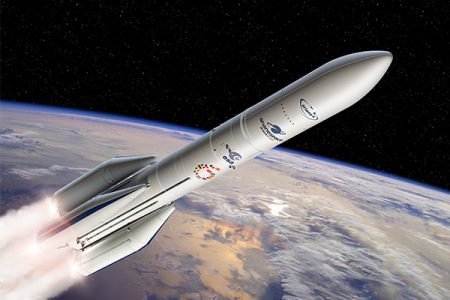 Fleet operator Intelsat has signed an agreement with commercial launch services provider Arianespace for two launches of three satellites, Galaxy 35, Galaxy 36 and Galaxy 37, on Ariane 5 and Ariane 6 launch vehicles.
Fleet operator Intelsat has signed an agreement with commercial launch services provider Arianespace for two launches of three satellites, Galaxy 35, Galaxy 36 and Galaxy 37, on Ariane 5 and Ariane 6 launch vehicles.
Arianespace will launch the Galaxy 35 and Galaxy 36 satellites together as a stacked pair in 2022, and Galaxy 37 in 2023. Both launches will be performed from Europe’s Spaceport in South America aboard an Ariane 5 and Ariane 64 launch vehicle, respectively.
All three satellites will operate in the upper portion of the C-band spectrum, a range of wireless radio frequencies that is used for critical telecommunications and data connectivity around the world.
With this mission, Intelsat will meet the accelerated C-band spectrum clearing timelines established by the US Federal Communications Commission (FCC) earlier this year, in order to make the lower portion of the C-band spectrum available to mobile network operators to further the rollout of critical 5G services.
Maxar Technologies will build the three satellites, all using Maxar’s industry-leading 1300-class platform, in its manufacturing facility in Palo Alto, California.
Commenting on the development, Stéphane Israël, CEO of Arianespace, said: “We couldn’t be more thrilled to sign this agreement to launch three payloads for Intelsat. It is a profound honour to see the perpetuation of this deep and lasting relationship with Intelsat while enabling the roll-out of 5G in the US. We are all the more honoured that Intelsat has opted for an Ariane 6 vehicle for the first time.”
“Intelsat looks forward to continuing our longstanding partnership with Arianespace to launch these satellites, which are critical to accelerating the clearing of the C-Band spectrum and ensuring the US maintains its leadership in 5G and other advanced telecommunications technologies,” added Mike DeMarco, the Chief Services Officer of Intelsat.














Add Comment